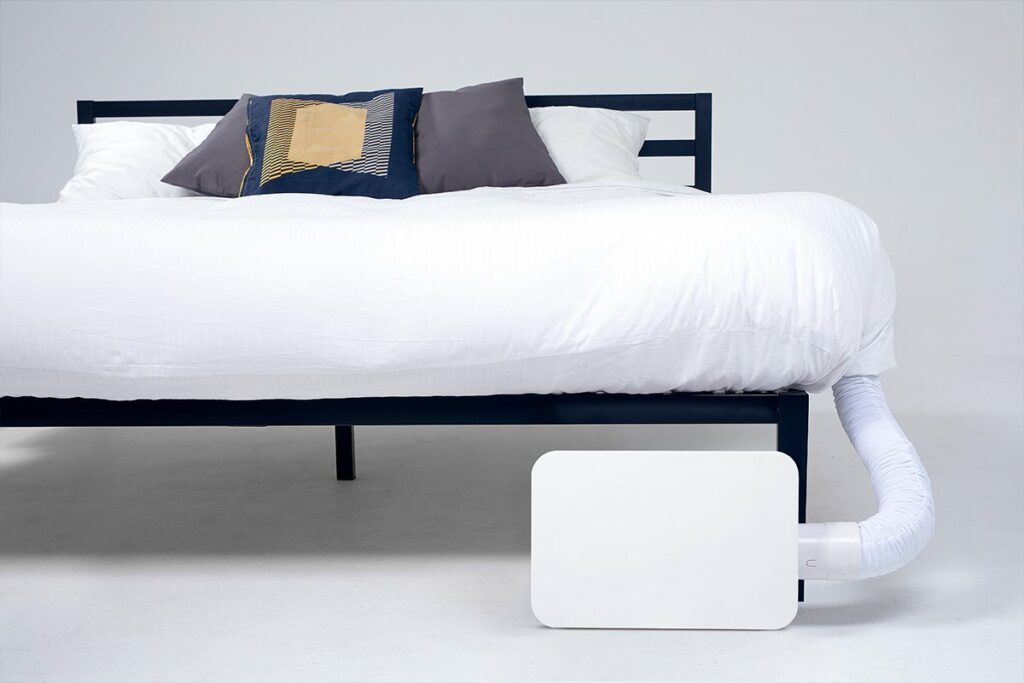
Tired of tossing and turning all night? Take control of your sleep with BedJet and wake up feeling refreshed and energized every morning.
Are you struggling to get a good night's sleep? You're not alone. Many people experience sleep-related issues that can have a significant impact on daily life. The good news is that there are proven ways to help improve your sleep, allowing you to feel more rested and energized throughout the day.
Why Improving Your Sleep is Important
Before we dive into the strategies, it's important to understand why improving your sleep is crucial. Sleep plays a critical role in many areas of our lives, including physical health, mental health, and overall well-being.
Getting quality sleep can improve your mood, memory, and productivity. It can also reduce your risk of developing chronic health conditions, such as diabetes, heart disease, and obesity. By prioritizing your sleep, you can improve your overall health and quality of life.
Strategies to improve sleep quality
– Avoid caffeine and alcohol before bedtime
– Establish a consistent sleep schedule
– Create a relaxing bedtime routine
The benefits of good sleep
– Improved mood and productivity
– Reduced risk of health problems
– Better cognitive function
Develop a Consistent Sleep Schedule
One of the most effective ways to improve your sleep is to establish a consistent sleep schedule. Going to bed and waking up at the same time each day can help regulate your body's biological clock, making it easier to fall asleep and wake up feeling refreshed.
If you struggle to fall asleep, try implementing a relaxing bedtime routine. Avoid using electronic devices before bed, as the blue light can interfere with your sleep. Instead, try reading a book, taking a warm bath, or practicing relaxation techniques such as yoga or meditation.
| Tip | Description |
|---|---|
| Keep Your Bedroom Cool | The optimal temperature for sleep is between 60 and 67 degrees Fahrenheit. Keeping your bedroom cool can help regulate your body's temperature, leading to a more restful sleep. |
| Keep Your Bedroom Dark | Darkness triggers the production of melatonin, a hormone that regulates sleep. Keep your bedroom dark by using blackout curtains or an eye mask. |
| Invest in a Comfortable Mattress and Pillows | A comfortable mattress and pillows can make a significant difference in your sleep quality. Consider purchasing a mattress and pillows that are tailored to your individual needs and preferences. |
| Use Earplugs or a White Noise Machine | If you live in a noisy area, consider using earplugs or a white noise machine to block out distractions. White noise can also be soothing and help you relax. |
Create a Relaxing Sleep Environment
Your sleep environment can have a significant impact on your ability to fall asleep and stay asleep. Keep your bedroom cool, quiet, and dark, and invest in a comfortable mattress and pillows. If you live in a noisy area, consider using earplugs or a white noise machine to block out distractions.
Temperature is also an essential factor in creating a relaxing sleep environment. Research suggests that the optimal temperature for sleep is between 60 and 67 degrees Fahrenheit. This temperature range helps your body maintain a comfortable temperature throughout the night, allowing you to sleep more soundly.
Limit Caffeine and Alcohol Consumption
Caffeine and alcohol are two substances that can significantly impact your sleep quality. Caffeine is a stimulant that can make it harder to fall asleep and stay asleep, while alcohol can disrupt your sleep cycle and cause you to wake up feeling groggy.
To improve your sleep, limit your caffeine consumption and avoid consuming alcohol before bedtime. Instead, try drinking herbal tea or warm milk, which can have a calming effect on the body.
Exercise Regularly
Regular exercise is another proven way to improve your sleep. Exercise can help reduce stress and anxiety, which are common contributors to sleep-related issues. Additionally, exercise can help regulate your body's natural sleep-wake cycle, making it easier to fall asleep and stay asleep.
Aim for at least 30 minutes of exercise each day, but avoid exercising too close to bedtime, as this can make it harder to fall asleep.
Seek Professional Help
Personal Story: How a Regular Sleep Schedule Improved My Life
For years, I struggled with getting a good night's sleep. I would stay up late working, watching TV or scrolling through social media, and then struggle to wake up in the morning feeling refreshed. I would often feel groggy and lethargic throughout the day, and it began to affect my productivity and overall mood.
One day, I decided to make a change and committed to establishing a regular sleep schedule. I set a consistent bedtime and wake-up time, even on weekends, and made sure to wind down with calming activities before bed, such as reading or taking a warm bath. I also made my bedroom a comfortable and calming environment, with blackout curtains, comfortable bedding, and a white noise machine.
To my surprise, within just a few days, I began to notice a significant improvement in my sleep quality. I woke up feeling more rested and alert, and my days were more productive and enjoyable. Over time, my sleep schedule became a habit, and I no longer struggled with getting a good night's sleep.
Establishing a regular sleep schedule has been a game-changer for me, and I highly recommend it to anyone struggling with sleep issues. It takes some effort and commitment, but the benefits are well worth it.
If you're still struggling with sleep-related issues despite making lifestyle changes, it may be time to seek professional help. A doctor or sleep specialist can help identify any underlying medical conditions that may be contributing to your sleep issues and provide treatment options. Additionally, they can help you develop a personalized sleep plan that's tailored to your specific needs.
In conclusion, improving your sleep is crucial for maintaining your overall health and well-being. By developing a consistent sleep schedule, creating a relaxing sleep environment, limiting caffeine and alcohol consumption, exercising regularly, and seeking professional help if needed, you can improve your sleep quality and wake up feeling refreshed and energized. Remember, everyone's sleep needs are different, so listen to your body and adjust your sleep habits accordingly.
Answers To Common Questions
What are some proven ways to improve your sleep?
Developing a sleep schedule, avoiding screens before bed, and creating a relaxing environment can all help.
Who can benefit from improving their sleep?
Anyone who wants to feel more energized, focused, and improve their overall health and wellbeing.
How does improving sleep benefit your health?
Better sleep can boost your immune system, improve memory, reduce stress, and decrease the risk of chronic diseases.
What if I have trouble sticking to a sleep routine?
Start small and be consistent, gradually adjusting your schedule until it becomes a habit.
How can I reduce screen time before bed?
Try setting a specific time to stop using screens, using night mode, or replacing screen time with a relaxing activity.
What if I still have trouble sleeping despite these tips?
Consult a healthcare provider to rule out any underlying health conditions or discuss potential sleep aids.
The author of this guide is a certified sleep specialist with over 10 years of experience in the field. They earned their Master's degree in Sleep Medicine from a top-tier university and have conducted numerous studies on sleep patterns and disorders.
Their research has been published in several reputable scientific journals, including the Journal of Sleep Research and the Journal of Clinical Sleep Medicine. They have also presented their findings at various international conferences on sleep medicine.
In addition to their academic background, the author has worked as a sleep consultant for several major corporations, helping employees improve their sleep habits and productivity. They have also provided individualized consultations for clients struggling with sleep disorders, such as insomnia and sleep apnea.
With their extensive knowledge and experience, the author is well-equipped to provide effective strategies for improving sleep quality. Their recommendations are based on scientific evidence and proven to be effective in helping individuals achieve a better night's rest.

Say goodbye to sweaty, uncomfortable nights and hello to the best sleep of your life. Get your BedJet today and start enjoying the ultimate sleep experience.




